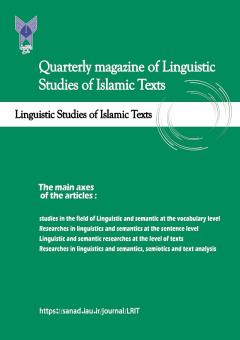The wear and tear of the Iranian-Islamic language and the modern western language
Subject Areas :
1 -
Keywords: Intellectual language, language games, intellectual literature, modern western language, Iranian-Islamic language,
Abstract :
The current research, with the methodological perspective of language play, follows the Iranian-Islamic culture and language, which encountered the modern western culture and language since the 19th century, during the "historical break". This historical rupture has occurred from the background of the Iranian-Islamic way of life and with the opening of the Iranian-Islamic language to the history of the modern world. The new meanings and concepts brought by this break have flowed from the other side of the world, from Europe to the Iranian-Islamic world. According to this perspective, the perception of Iranians in this historical situation when they were forced to face the West is important, and what is important for us today is to find out what they have been doing from the beginning until now in this confrontation and from the position of their visual language. What did they understand? And what could they do? The importance of this point is that in the unequal conditions of exposure, the Iranian thinker, based on his mind and language facilities in which he was raised, how he understood foreign concepts and cultural elements and formed the "intellectual language" in Iran; Because, he has seen and understood what he could see, not what the western rituals had and could reflect. Therefore, the extent and nature of what they could find out from their observation of the Western mirror was related to their knowledge of that mirror. Their recognition was conditioned by the linguistic and historical background in which they were located.
احمدي، بابك (1385). مدرنيته و انديشة انتقادي، تهران: نشر مركز.
آجوداني، ماشاءالله( 1382). يا مرگ يا تجدد (دفتري در شعر و ادب مشروطه)، تهران: اختران.
آجوداني،ماشاءالله ( 1382). مشروطه ي ايراني، ، تهران: اختران.
بروجردی، مهرزاد( 1377 ) .روشنفکران ايرانی و غرب، مترجم: جمشید شیرازی ناشر: فرزان روز،.
پارسي نژاد ، ايرج( 1380 ) . روشنگران ايرانی ونقد ادبی، تهران: سخن.
توکلیِ طرقی، محمد( 1382). تجددِ بومی و بازاندیشیِ تاریخ ، تهران: نشرتاریخ ایران.$$ حورا ياوری(1384 ) . ای کاش ما هم داستان می نوشتيم، (روزنامه شرق، ويژه نامه ادبيات انقلاب، بهمن1384).
حائري، عبدالهادي (1367) نخستين روياروييهاي انديشه گران ايران با دو رويه تمدن بورژوازي غرب، تهران: اميرکبير.
حائري، عبدالهادي ( 1364 ) تشيع و مشروطيت در ايران و نقش ايرانيان مقيم عراق، تهران: اميركبير.
داوري اردکاني ، رضا( 1375 ) دين و تجدد، نامه فرهنگ پاییز ۱۳۷۵ شماره ۲۳.
زرگرينژاد، غلامحسين( 1374 ) رسائل مشروطيت، تهران: كوير.
زرين کوب، عبدالحسين( 1361 ) ، نقد ادبي، جلد 2، تهران: اميرکبير.
سعيد، ادوارد ( 1371 ) شرق شناسي، ترجمه ي عبدالرحيم گواهي، تهران: دفتر نشر فرهنگ اسلامي.
ضيمران، محمد (1386). ژاك دريدا و متافيزيك حضور، تهران: هرمس.
قيصري، علي( 1383 )روشنفکران ايران در قرن بيستم، ترجمه ي محمد دهقان، تهران: هرمس.
لودويگ ، ويتگنشتاين، (1379). رسالهی منطقی - فلسفی ، ترجمة ميرشمس الدين اديب سلطاني، تهران: اميركبير.
مك گين، ماري (1384). ويتگنشتاين و پژوهشهاي فلسفي، ترجمة ايرج قانوني، تهران: نشر ني.
مارکس کارل و انگلس فردريک(1380) .مانيفيست کمونيست، ترجمه ي حسن مرتضوي و محمود عباديان، (مجموعه مانيفيست پس از 150 سال، تهران: آگه، 1380)
ميلاني، عباس(1378 ) .تجدد و تجددستيزي در ايران، تهران: نشر آتيه.
ميرسپاسي، علی( 1384 ). تأملی در مدرنيته ايرانی، ترجمه ی جلال توکليان، تهران: طرح نو.


